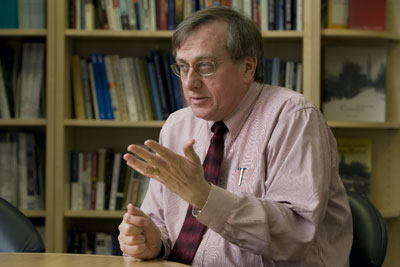Provost says faculty will shrink over three years, but savings will ensure fiscal recovery
By Susan Kelley

The number of faculty members will shrink through attrition over the next three years as Cornell grapples with its economic challenges, Kent Fuchs said Feb. 12 in his first interview with the Cornell Chronicle since becoming provost.
"Some faculty searches will proceed, but significantly fewer across the entire university," he said. "We need to manage the reduction in the number of faculty strategically, so that high-priority areas don't lose critical faculty."
Fuchs said he will initiate an institutional planning process across the campus in March to establish priorities and to develop strategies for enhancing excellence even as expenditures decline. The first task force to be established will assess future undergraduate and graduate enrollments, taking into account the decrease in faculty and an expected increase of 100 freshmen in fall 2009. Vice President for Student and Academic Services Susan Murphy and Deputy Provost David Harris will co-chair the task force, he said.
"The answer is really unclear whether undergraduate enrollment should grow any more from the perspective of the budget. If you have to invest in new facilities to provide for the students, if you have to hire additional staff and faculty, you're losing money. We also must carefully consider the impact on faculty research and scholarship and on the quality of our education."
Regarding Cornell's measures to combat an economy in steep decline, Fuchs told a Faculty Senate meeting Feb. 11, "The situation is grave. If we do nothing, this institution is at great risk." He told the faculty that the university is facing a deficit of more than $200 million, which represents approximately 10 percent of the entire campus budget and nearly 17 percent of the unrestricted budget.
Describing one of the measures the university is taking, he told the Chronicle that about $10 million, money saved as a result of $60 million in budget cuts for fiscal year 2010 (beginning July 1), will be re-invested in units that are unable to fully absorb the budget reductions that were sized proportional to the revenues of each unit. Those units include the College of Veterinary Medicine; the College of Architecture, Art and Planning; the School of Continuing Education and Summer Sessions; and the Office of the Vice Provost for Research.
"This year, the reinvestments were based on the need to financially stabilize those units," he said. "Next year, the reinvestments will be much larger in certain areas and not in others, based on academic and institutional priorities."
Referring to President David Skorton's January statement that Cornell will reduce its Ithaca campus budget by 5 percent in fiscal year 2010 in order to begin to address the budget shortfall, Fuchs said vice presidents and deans have until March 2 to spell out how they will cut their budgets.
They can reduce their expenditures how they see fit -- with the exception of cuts that directly affect other units. "We're asking that they discuss that with us and the other units," Fuchs said. "We've also asked the deans to keep as their top priority retention of staff positions and faculty searches. But they still have to meet the budget goal, so I know that both the size of the faculty and overall workforce will be reduced."
For the first time, the provost's office has distributed the budget of each unit university wide to all vice presidents and deans, Fuchs said. "In a time of financial crisis it's important to be public and very visible. It makes everybody understand the cuts and investments in the larger context of the university." As part of the campus-wide 5 percent budget cut, both the President's and Provost's office are taking 10 percent budget reductions.
In the long term, however, Fuchs said he remains optimistic about the university's future. He said that in March he and Executive Vice President Stephen Golding will present to the Cornell Board of Trustees the institutional planning process, which will create a comprehensive five-year strategy that will tie together goals for the institution, academics and the budget, Fuchs said. "We expect, coming out of this, it will change our budgeting process. It's one way of taking advantage of the economic crisis."
This strategic planning process will engage faculty and staff from across campus and will include savings through attrition and mergers and elimination of some academic units and programs. "I don't have a list at this point" of programs at risk, Fuchs said. "But I will ask the faculty and academic leaders to consider ways we can consolidate to enhance our excellence."
The plan will also include investment in high-priority areas and facilities to increase efficiency, visibility and impact on ranking.
"This is very much a transient period," Fuchs said. "For three years, we'll dramatically tighten our belts and reduce our expenditures. Then we'll come out of this refocused with a set of strategic priorities in which we will invest."
Media Contact
Get Cornell news delivered right to your inbox.
Subscribe